2000 AUDI ALLROAD maintenance
[x] Cancel search: maintenancePage 202 of 306
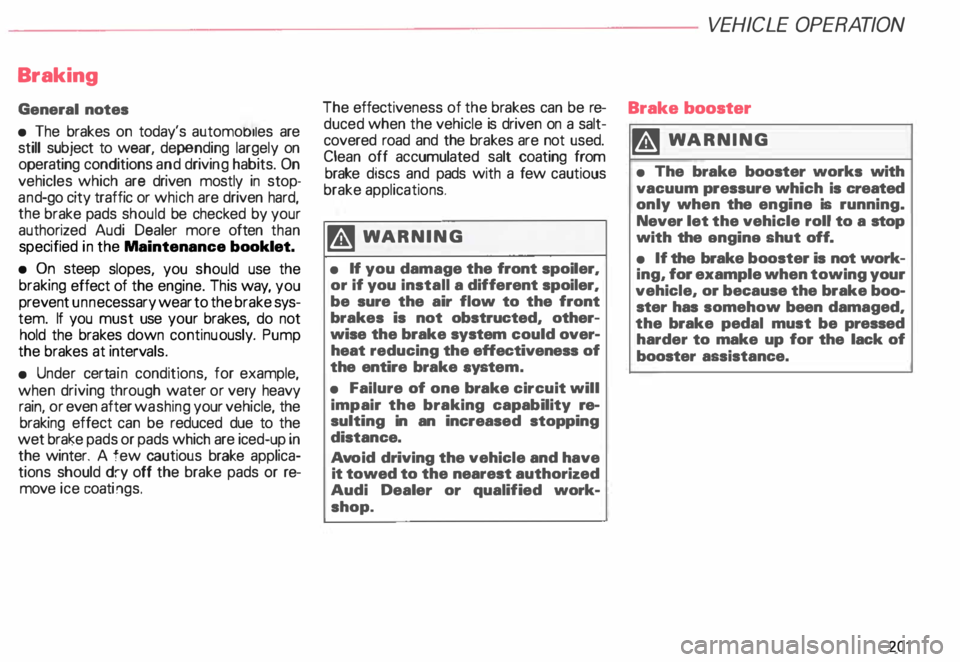
Braking
General notes
• The brakes on today's automobiles are
still subject to wear, depending largely on
operating conditions and driving habits. On
vehicles which are driven mostly in stop
an d-go city traffic or which are driven hard,
the brake pads should be checked by your
authorized Audi Dealer more often than
specified in the Maintenance booklet.
• On steep slopes, you should use the
braking effect of the engine. This way, you
prevent unnecessary wear to the brake sys
tem. If you must use your brakes, do not
hold the brakes down continu ously. Pump
the brakes at interv als.
• Under certain conditions, for example,
when driving through water or very heavy
rain, or even after washing your vehicle, the
braking effect can be reduced due to the
wet brake pads or pads which are iced-up in
the winter. A few cautious brake applica
tions should dry off the brake pads or re
move ice coati ngs. The
effect iveness of the brakes can be re
duced when the vehicle is driven on a salt
covered road and the brakes are not used.
Clean off accumulated salt coating from
brake discs and pads with a few cautious
brake applications.
�W ARNING
• If you damage the front spoiler,
or if you install a different spoiler,
be sure the air flow to the front
brakes is not obstructed, other
wise the brake system could over
heat reducing the effectiveness of
the entire brake aystem.
• Failure of one brake circuit will
impair the braking capability re
sulting in an increased stopping
distance.
Avo id driving the vehicle and have
it towed to the nearest authorized
Audi Dealer or qualified work
shop. VEH
ICLE OPERATION
Brake booster
�W ARNING
• The brake booster works with
vacuum pressure which is created
only when the engine is running.
Never let the vehicle roll to a stop
with the angina shut off.
• If the brake booster is not work
ing, for example when towing your
vehicle, or because the brake boo
ster has somehow been damaged,
the brake pedal must be pressed
harder to make up for the lack of
booster assistance.
201
Page 212 of 306
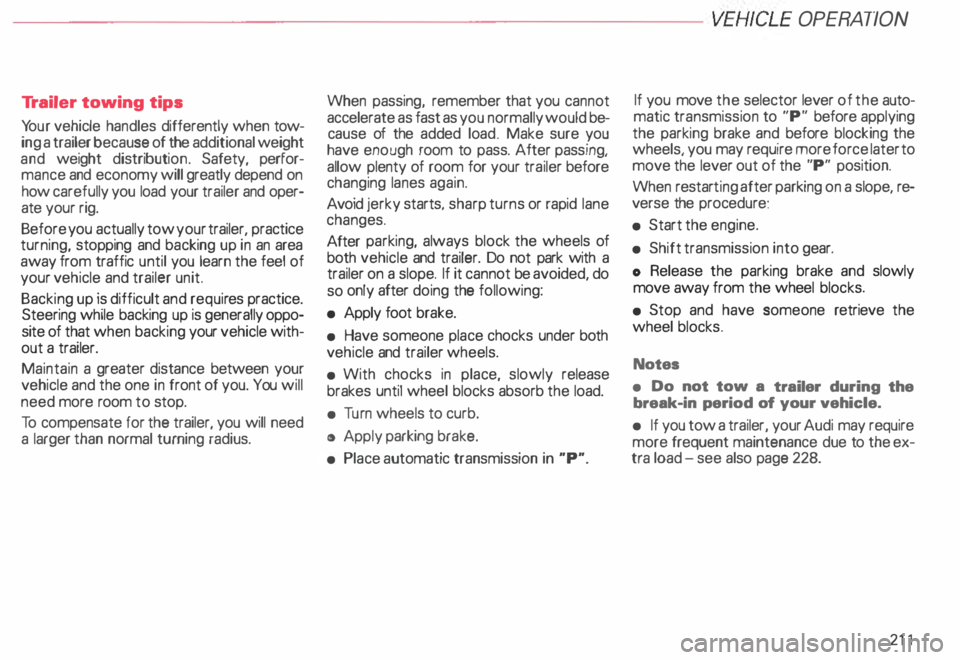
-----------------------VEHICL E OPER ATION
Tr ailer towing tips
Yo ur vehicle handles differently when tow
ing a trailer because of the additional weight
and weight distribution. Safety, perfor
mance and economy will greatly depend on
how carefully you load your trailer and oper
ate your rig.
Before you actually tow your trailer, practice
turning, stopping and backing up in an area
away from traffic until you learn the feel of
your vehicle and trailer unit.
Backing up is difficult and requir es practice.
Steering while backing up is generally oppo
site of that when backing your vehicle with
out a trailer.
Maintain a greater distance between your
vehicle and the one in front of you. You will
need more room to stop.
To compensate for the trailer, you will need
a larger than normal turning radius. When
passing, remember that you cannot
accelerate as fast as you normally would be
cause of the added load. Make sure you
have enough room to pass. After passing,
allow plenty of room for your trailer before
changing lanes again.
Avoid jerky starts, sharp turns or rapid lane
changes.
After parking, always block the wheels of
both vehicle and trailer. Do not park with a
trailer on a slope. If it cannot be avoided, do
so only after doing the following:
• Apply foot brake.
• Have someone place chocks under both
vehicle and trailer wheels.
• With chocks in place, slowly release
brakes until wheel blocks absorb the load.
• Turn wheels to curb.
o Apply parking brake.
• Place automatic transmission in "P". If
you move the selector lever of the auto
matic transmission to "P" before applying
the parking brake and before blocking the
wheels, you may require more force later to
move the lever out of the "P" position.
When restarting after parking on a slope, re
verse the procedure:
• Start the engine.
• Shift transmission into gear.
o Release the parking brake and slowly
move away from the wheel blocks.
• Stop and have someone retrieve the
wheel blocks.
Notes
• Do not tow a trailer during the
break-in period of your vehicle.
• If you tow a trailer, your Audi may require
more frequent maintenance due to the ex
tra load -see also page 228.
211
Page 229 of 306

VEHICLE
CARE---------------------------------------------------
Maintenance
Yo ur vehicle has been designed to help
keep maintenance requirements to a mini
mum.
However. a certa in amount of regular main
tenance is still necessary to assure your ve
hic le's safety, economy and reliabili ty.
c£> By regularly maintaining your
vehicle, you help make sure that
emission standards are maintai ned,
thus minimizing adverse effects on
the envir onment.
For detailed vehicle maintenance consult
your Maintenance booklet.
Under difficult operating condi
tions, for example at extremely low out
side temperatures, in very dusty regions,
when towing a trailer very frequently, etc.,
some service work should be performed
between the intervals specified.
This applies particularly to:
• oil changes, and
• cleaning or replacing the air filter.
228 Important
considerations for
you and your vehicle:
The increasing use of electr onics, sophisti
cated fuel injection and emission control
systems, and the generally increasing tech
nical complexity of today's automobiles,
have steadily reduced the scope of mainte
nance and repairs which can be carried out
by vehicle owners. Also, safety and en
vironmental concerns place very strict
limi ts on the nature of repairs and adjust
ments to engine and transmission parts
which an owner can perform . Main
tenance, adjustments and repairs usu
ally require special tools, testing devices
and other equipment available to specially
trained workshop personnel in order to as
sure proper performance, reliability and
safety of the vehicle and its many systems.
Impr oper maintenan ce, adjustments and
repairs can impair the operation and reliabil
ity of your vehicle and even void your ve
hicle warranty. Therefore, proof of servicing
in accordance with the maintenance
schedule may be a condition for upholding
a possible warranty claim made within the
warranty period.
Above all, operational safety can be ad
versely affected, creating unnecessary
risks for you and your passengers.
Page 230 of 306
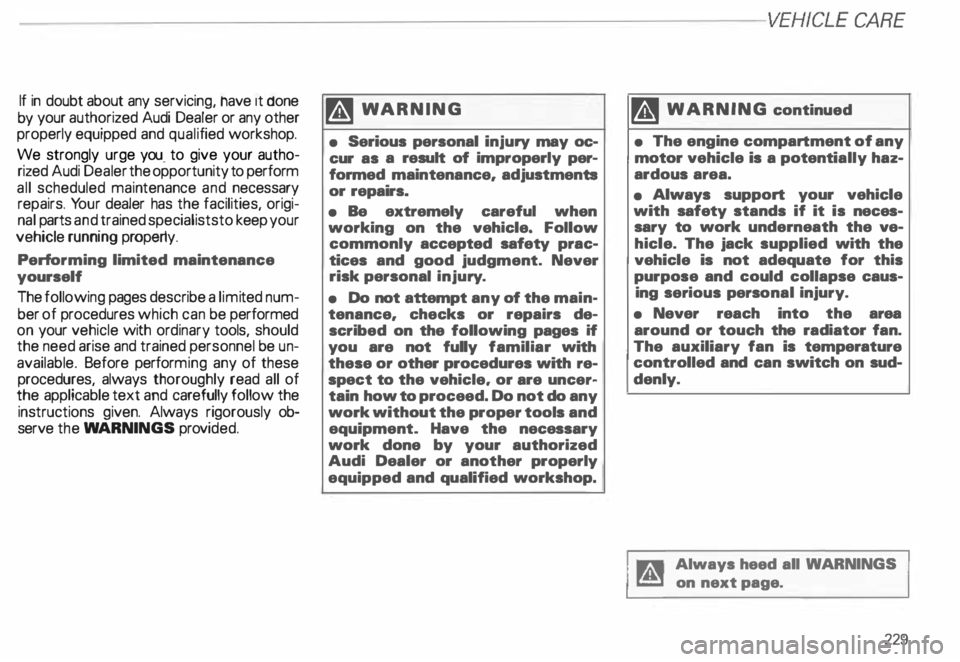
---------------------------------------------------VEHICLE CARE
If in doubt about any servicing, nave 1t done
by your authorized Audi Dealer or any other
properly equipped and qualif ied workshop.
We strongly urge you_ to give your autho
rized Audi Dealer the opportunity to perform
all scheduled maintenance and necessary
repairs. Your dealer has the facilities, origi
nal parts and trained specialists to keep your
vehicle running properly.
Perf orming limited maintenance
yourself
The following pages describe a limited num
ber of procedures which can be performed
on your vehicle with ordinary tools, should
the need arise and trained personnel be un
available. Before perform ing any of these
procedures, always thoroughly read all of
the applicable text and carefully follow the
instructions given. Always rigorously ob
serve the WA RNINGS provided. �W
ARNING
• Serious personal injury may oc
cur as a result of improperly per
formed maintenance, adjustments
or repairs.
• Be extremely careful when
working on the vehicle. Follow
commonly accepted safety prac
tices and good judgment. Never
risk personal injury.
• Do not attempt any of the main
tenance, checks or repairs de
scribed on the following pages if
you are not fully familiar with
these or other procedures with re
spect to the vehicle, or are uncer
tain how to proceed. Do not do any
work without the proper tools and
equipment. Have the necessary
work done by your authorized
Audi Dealer or another properly
equipped and qualified workshop. '4
WARNING continued
• The engine compartment of any
motor vehicle is a potent ially haz
ardous area.
• Always support your vehicle
with safety stands if it is neces
sary to work underneath the ve
hicle. The jack supplied with the
vehicle is not adequate for this
purpose and could collapse caus
ing serious personal injury.
• Never reach into the area
around or touch the radiator fan.
The auxiliary fan is temperature
controlled and can switch on sud
denly.
Always heed all WAR NINGS
on next page.
229
Page 242 of 306
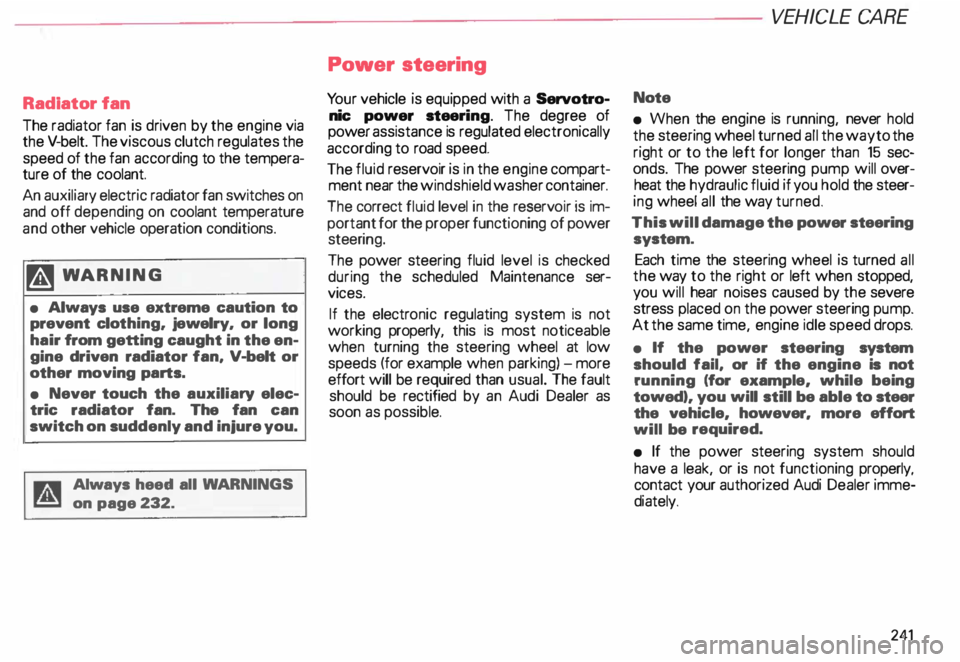
Radiator
fan
The radiator fan is driven by the engine via
the V-belt. The viscous clutch regulates the
speed of the fan according to the tempera
ture of the coolant.
An auxiliary electric radiator fan switches on
and off depending on coolant temperature
and other vehicle operation conditions.
� WARNING
• Always use extreme caution to
prevent clothing. jewelry, or long
hair from getting caught in the en
gine driven radiator fan, V-belt or
other moving parts.
• Never touch the auxiliary elec
tric radiator fan. The fan can
switch on suddenly and injure you.
Always heed all WA RNINGS
on page 232. Power
steering
Yo ur vehicle is equipped with a Servotro
nic power steering. The degree of
power assistance is regulated electronically
according to road speed.
The fluid reservoir is in the engine compart
ment near the windshield washer container.
The correct fluid level in the reserv oir is im
portant for the proper functioning of power
steer ing.
The power steering fluid level is checked
during the scheduled Maintenance ser
vices.
If the electronic regulating system is not
working properly, this is most noticeable
when turning the steering wheel at low
speeds (for example when parking) -more
effort will be required than usual. The fault
should be rectified by an Audi Dealer as
soon as possible. VEH
ICLE CARE
Note
• When the engine is running, never hold
the steering wheel turned all the way to the
right or to the left for longer than 15 sec
onds. The power steering pump will over
heat the hydraulic fluid if you hold the steer
ing wheel all the way turned.
This will damage the power steering
system.
Each time the steering wheel is turned all
the way to the right or left when stopped,
you will hear noises caused by the severe
stress placed on the power steering pump.
At the same time, engine idle speed drops.
• If the power steering system
should fail, or if the engine is not
running (for example, while being
towed). you will still be able to steer
the vehicle, however. more effort
will be required.
• If the power steering system should
have a leak, or is not functioning properly,
contact your authorized Audi Dealer imme
diately.
241
Page 244 of 306
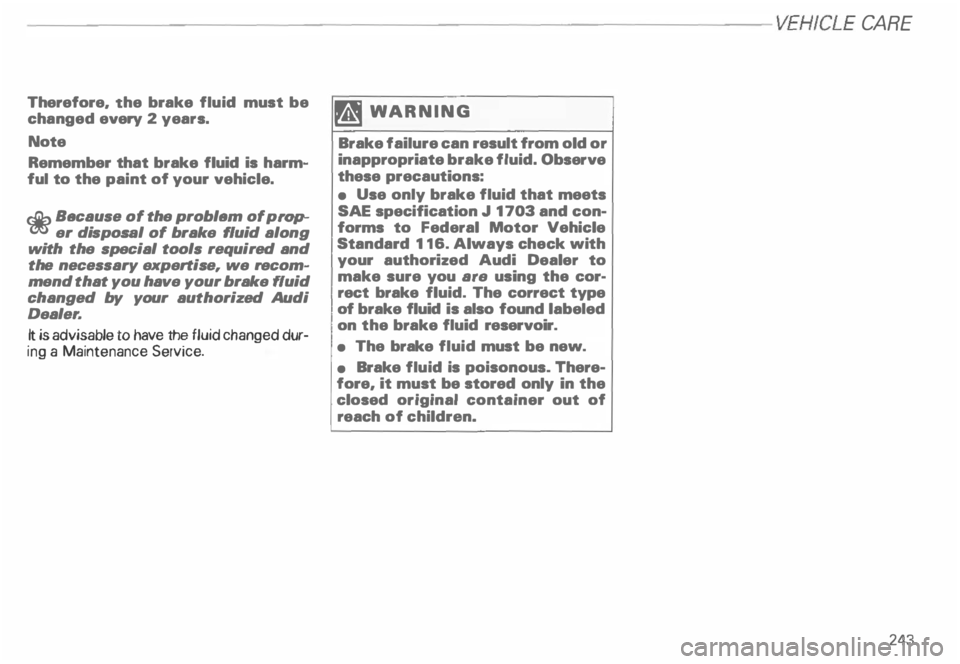
-------------------------VEHICLE CA
RE
Therefore, the brake fluid must be
changed every 2 years.
Note
Remember that brake fluid is harm
ful to the paint of your vehicle.
c£> Because of the problem of pro�
er disposal of brake fluid along
with the special tools required and
the necessary expertise, we recom
mend that you have your brake fluid
changed by your authorized Audi
Dealer.
It is advisable to have the fluid changed dur
ing a Maintenance Service. �W
ARNING
Brake failure can result from old or
inappropriate brake fluid. Observe
these precautions:
• Use only brake fluid that meets
SAE specification J 17 03 and con
forms to Federal Motor Vehicle
Standard 116. Always check with
your authorized Audi Dealer to
make sure you are using the cor
rect brake fluid. The correct type
of brake fluid is also found labeled
on the brake fluid reservoir.
• The brake fluid must be new.
• Brake fluid is poisonous. There
fore, it must be stored only in the
closed original container out of
reach of children.
243
Page 247 of 306
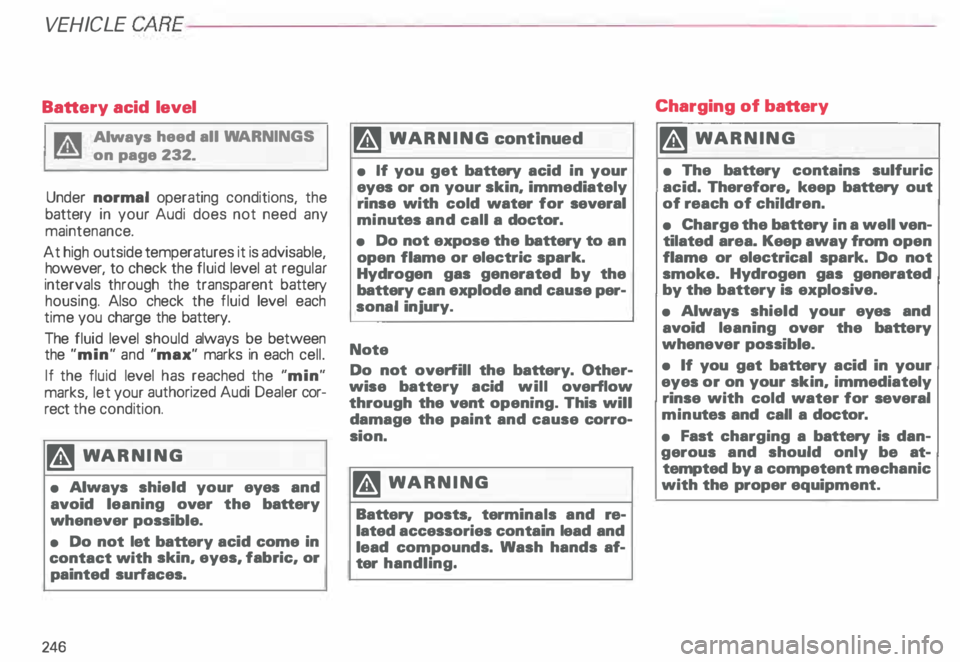
VEHICLE CA
RE---------------------------------------------------
Battery acid level
g Always heed all WA RNINGS
� on page 232.
Under normal operating conditions, the
battery in your Audi does not need any
maintenance.
At high outside temperatures it is advisable,
however, to check the fluid level at regular
intervals through the transparent battery
housing. Also check the fluid level each
time you charge the battery.
The fluid level should always be between
the "min" and "max" marks in each cell.
If the fluid level has reached the "min"
marks, let your authorized Audi Dealer cor
rect the condition.
�W ARNIN G
• Always shield your eyes and
avoid leaning over the battery
whenever possible.
• Do not let battery acid come in
contact with skin, eyes, fabric, or
painted surfaces.
246 ��
WARNING continued
• If you get battery acid in your
eyes or on your skin, immediately
rinse with cold water for several
minu tes and call a doctor.
• Do not expose the battery to an
open flame or electric spark.
Hydrogen gas generated by the
battery can explode and cause per
sonal injury.
Note Do not overfill the battery. Other
wise battery acid will overflow
through the vent opening. This will
damage the paint and cause corro
sion.
�W ARNIN G
Battery posts, terminals and re
lated accessories contain lead and
lead compounds. Wash hands af
ter handling. Charging
of battery
�W ARNING
• The battery contains sulfuric
acid. Therefore, keep battery out
of reach of children.
• Charge the battery in a well ven
tilated area. Keep away from open
flame or electrical spark. Do not
smoke. Hydrogen gas generated
by the battery is explosive.
• Always shield your eyes and
avoid leaning over the battery
whenever possible.
• If you gat battery acid in your
eyes or on your skin, immediately
rinse with cold water for several
minu tes and call a doctor.
• Fast charging a battery is dan
gerous and should only be at
tempted by a competent mechanic
with the proper equipment.
Page 249 of 306
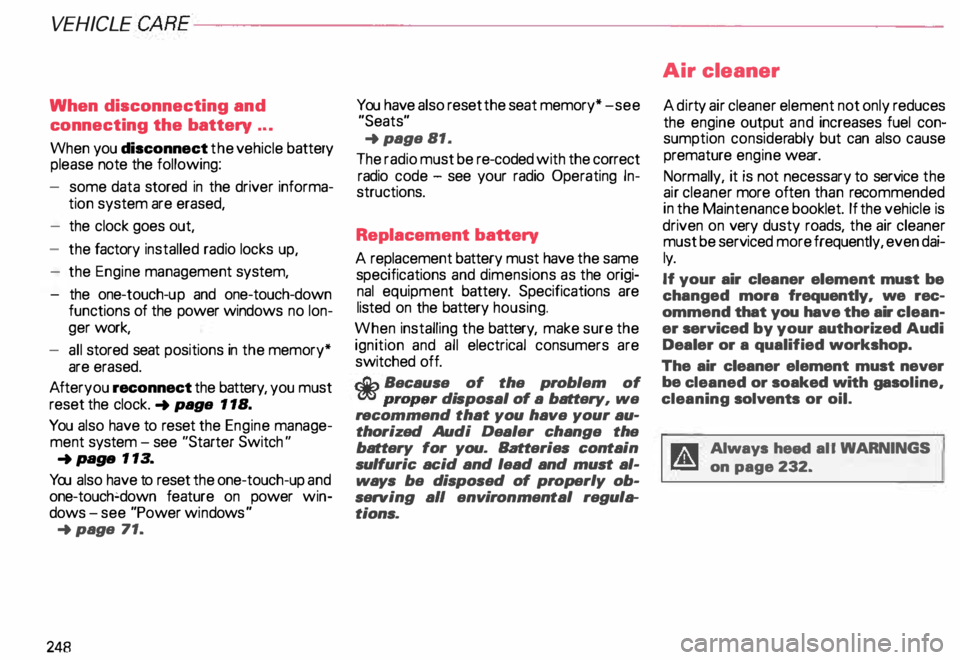
VEHICLE CA
RE----------------------------------------------------
When disconnecting and
connecting the battery ...
When you disconnect the vehicle battery
please note the following:
- some data stored in the driver informa-
tion system are erased,
- the clock goes out,
- the factory installed radio locks up,
- the Engine management system,
- the one-touch-u p and one-touch-down
functions of the power windows no lon
ger work,
- all stored seat positions in the memory*
are erased.
Af teryou reconnect the battery, you must
reset the clock. � page 118.
You also have to reset the Engine manage
ment system -see "Starter Switch "
�pa ge 113.
You also have to reset the one-touch-up and
one-touch�down feature on power win
dows -see "Power windows "
�p age 71.
248 You
have also reset the seat memory* -see
"Seats"
� page 81.
The radio must be re-coded with the correct
radio code - see your radio Operating In
structions.
Replacement battery
A replacement battery must have the same
specifications and dimensions as the origi
nal equipment battery. Specifications are
listed on the battery housing.
When installing the battery, make sure the
ignition and all electrical consumers are
switched off.
r.Gb. Because of the problem of �proper di
sposal of a battery, we
recommend that you have your au
thorized Audi Dealer change the
battery for you. Batteries contain
sulfuric acid and lead and must al
ways be disp osed of properly ob
serving all environmental regula
tions. Air
cleaner
A dir ty air cleaner element not only reduces
the engine output and increases fuel con
sumption considerably but can also cause
premature engine wear.
Normally, it is not necessary to service the
air cleaner more often than recommended
in the Maintenance booklet. If the vehicle is
driven on very dusty roads, the air cleaner
must be serviced more frequently, even dai
ly.
If your air cleaner element must be
changed mora frequently, we rec
ommend that you have the air clean
er serviced by your authorized Audi
Dealer or a qualified workshop.
The air cleaner element must never
be cleaned or soaked with gasoline,
cleaning solvents or oil.
g Always heed all WARN INGS
t!!3 on page 232.